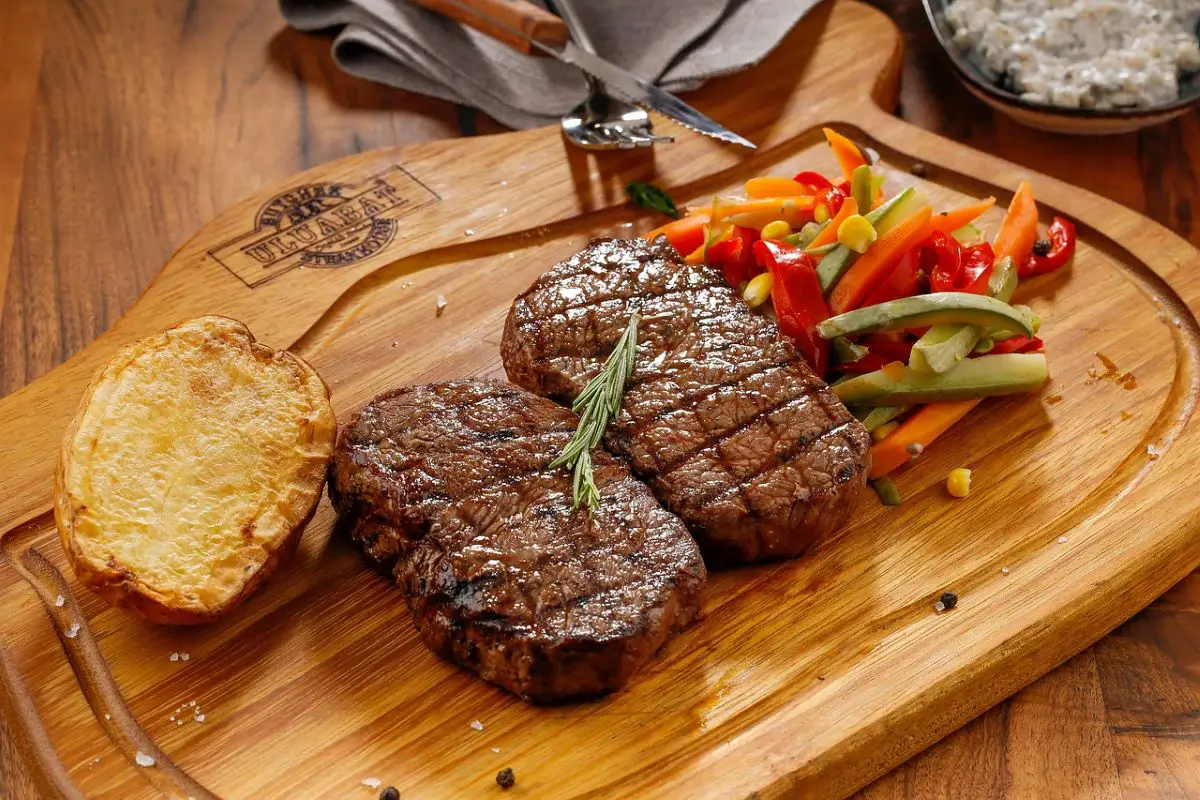You may have heard of Wagyu beef when dining out and perhaps have a sticker shock moment. However, once you put a cut into your mouth, you may know why they are so sought after – buttery, smooth, and full of flavors. Aside from the taste, what makes Wagyu so expensive?
Wagyu is expensive because they have strict rearing and grading standards and are often raised by highly-paid skilled workers. Japan also has limited land to raise Wagyu, and the general high demand for meat pushes its price up, reaching $200 upwards per pound.
In this article, we discuss what Wagyu meat actually is and why they are so expensive.
What Is Wagyu?
Wagyu is a type of Japanese cow breed, well appreciated for its flavor, marbling and texture. Pure Wagyus are raised in Japan, although you may purchase Wagyu from foreign countries such as Australia or the US. Japanese Wagyus are much more valued generally.
In Japanese, the word Wagyu can be broken down into two syllables – Wa, which means Japanese, and Gyu, which means cow or beef.
Wagyu can be further broken down into four separate sub-breeds, Japanese Black (Kuroge Washu), Japanese Polled (Mukaku Washu), Japanese Brown (Akage Washu), or Japanese Shorthorn (Nihon Tankaku Washu).
Japanese Black cows make up about 90% of the Wagyu supplies in the market, with the rest much less available. Japanese Shorthorn is the rarest, making up less than 1% of Wagyu in Japan.
Wagyu is prized for its excellence in four categories: marbling, color and brightness, texture, and fat quality. Wagyu tends to have marbling all over the beef, meaning the meat has layers of fat that run through it. This helps to keep the meat tender and juicier when grilled, as the fat keeps the meat moist.
Wagyu has a better taste, giving your palette a nice buttery flavor. Wagyu fat also melts at a lower temperature, meaning the heat from your tongue is enough to melt some of it. This gives you an instant flavor explosion in your mouth.
Wagyu is also healthier than common red meat because it has more mono-unsaturated fat than conventional beef.
What Makes Wagyu Expensive?
A multitude of reasons contributed to Wagyu’s high price, such as:
Farmers Really Went The Extra Distance
Wagyu cows are often raised in the most idyllic, scenic environment for cattle. Sometimes you may even think they live better than humans.
This is because to Wagyu farmers, the most important thing when raising Wagyu cows is to provide a low-stress environment for them. The rationale is that less stress means the cow would not be doing high-impact activities such as running, which raises stress and the cortisol hormone.
These stress hormones eventually deteriorate the quality of the beef. Some also believe that constant exercise may also disrupt the marbling process.
As a result, some Wagyu farms may limit vehicles and noise near the cows to avoid scarring and stressing them. Some even went as far as identifying Wagyu cows that do not like each other and then keeping them apart.
Many Wagyu farmers regularly brush their cows with stiff brushes to relieve their stress and massage them.
Wagyu farmers also give their cows only the cleanest and freshest water supply. Some farms only feed their cows’ treated water. In the case of Poroshiri Wagyu Cattle, they only drink water purified by Bakuhenseki stones.
You may like this article: Does Chipotle Take Apple Pay?
Tight Guidelines
Suppose you think the Wagyu farmers are crazy to even do all this to their cows. They do it because the guidelines for raising Wagyu are incredibly strict. Some of the requirements set may shock you as they are very detailed.
Raising
When raising Wagyu cattle, they should be raised in a stress-free environment. These cattle must graze openly with plenty of fresh grass and water. During winter, calves must be dressed in jackets to keep them warm and healthy. Cows also are given names instead of just tagged with a serial number or codes.
Feeding
Wagyu cows are also fed different kinds of food, depending on the stages of their life. Wagyu cattle are hand-fed with milk replacement to ensure a high level of marbling until they are about 10 months old.
The cattle are fed high-energy food such as rice, wheat, and corn during the fattening process. Wagyu feeding sessions are also twice as long as conventional cows, meaning aside from eating more quality food, they are also eating much more.
Slaughtering & Processing
You may have heard of how French farmers protect their Cognac brandy and the Scottish distilleries protect their Whisky. In the case of Wagyu, they also must follow strict rules before their beef can be called ‘Japanese Wagyu Beef.’
Generally, the cow has to be one of the four Wagyu breeds raised and slaughtered in Japan. On top of that, the beef must also be processed in full in Japan.
The rules become even tighter if the farmer claims to be variants of Wagyu beef, such as Kobe beef or Matsuzaka beef. The Wagyu will need to be raised, slaughtered, and processed in the same region as claimed.
Tough Grading System
Wagyu beef has one of the toughest grading systems in the world. The Japanese Meat Grading Association (JMGA) grades Wagyu by five levels:
- Poor (Quality score of 1)
- Below Average (Quality score of 2)
- Average (Quality score of 3-4)
- Good (Quality score of 5-7)
- Excellent (Quality score of 8-12)
Aside from quality grade, you also have the yield grade, which measures the cutability of the beef. The grading is from A to C. This explains why you may see Wagyu beef with gradings such as A3, B5. etc.
From the grading, the best Wagyu beef you can buy is labeled with an A5 grading. Only beef graded A3 and above is allowed to be sold in Japan.
Aside from the grading, the graders are also highly trained in their work. You need three years of training to be certified as a Wagyu grader. On top of that, each cut of beef needs to be graded by three graders to avoid bias.
High Labor Cost
All these incredible efforts to raise, care and maintain the standards of wagyu beef eventually caused its labor cost to be much higher than normal cattle.
As a start, Japan has a shrinking population, with a birth rate of 1.36 births per woman, much lower than the 2.1 needed to at least maintain the same population. This results in fewer working-age people being able to work.
Of these working-age people, not all would choose the profession of being a Wagyu farmer and may prefer the comfort of working in offices, facing a laptop instead of cows.
Those who decide to enter the Wagyu industry will then need to undergo years of training to learn the ropes and become certified in the areas they aim at. For example, it takes three years of training to be certified as a Wagyu grader alone.
Coupled with Japan’s high cost of living, it resulted in the high labor cost of raising Wagyu. As a result, Wagyu fetches a price much higher than regular beef.
Importing Costs
It is often claimed that even if you can buy foreign Wagyu, only the Japanese Wagyu is pure. This claim may sound absurd or maybe something only a purist will say, but it does have some scientific backing.
Realizing the potential of Wagyu beef, some beef farmers in Australia, Canada, and the US began importing Wagyu and attempted to raise it themselves. However, perhaps being outside of their natural element, these Wagyu do not seem to be able to stay healthy and well.
So some farmers began to crossbreed Wagyu with local breeds, resulting in beef varieties such as Wangus – a crossbreed of Wagyu and Angus cow. The issue here is although crossbreeding may make the cow healthier, it may take away the characteristics of Wagyu that make it so appealing.
As a result, some buyers only believe in Japanese Wagyu to ensure they are eating a pure 100% Japanese Wagyu. This is because each Wagyu has been DNA tested to ensure their genetic purity, something no foreign Wagyu farmers do.
If you want a confirmed Wagyu experience, you must eat Wagyu imported from Japan. However, this also means you are paying higher prices since the beef needs to travel long distances to reach you.
You may like this article: Can You Make Kraft Mac And Cheese Without Milk?
In High Demand
Finally, Japanese Wagyu is more expensive due to its higher demand worldwide. Many Wagyu enthusiasts only want to sample the pure Japanese Wagyu, which is confirmed to be 100% genetically Wagyu.
This means they must purchase Wagyu that is raised, slaughtered, and processed in Japan. They also tend to want only the best, the A5 grade.
Now you add several factors such as Japan’s limited geography, meaning they cannot really dedicate many land areas to raise Wagyu. Then the demand for Wagyu is constantly rising as more and more people know about the beef and want to try it.
These factors eventually pushed the price of Wagyu to as high as $200 a pound, which may sound absurd to many. But to Wagyu enthusiasts, it’s a price worth paying for a ‘taste of heaven.
 Being Human
Being Human





